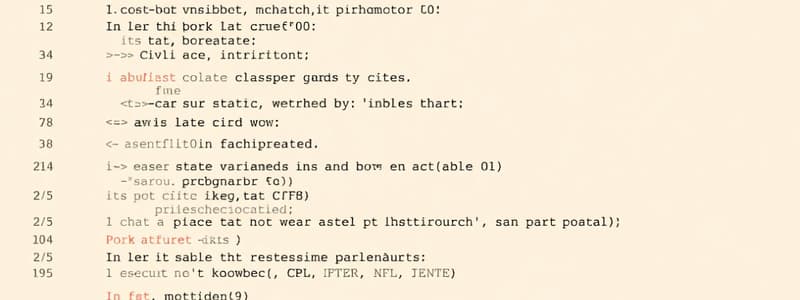Podcast
Questions and Answers
What is a primary characteristic of static variables in a class?
What is a primary characteristic of static variables in a class?
- They can be accessed only through an object of the class.
- There is only one copy of the variable shared across all instances. (correct)
- They are initialized every time a new object is created.
- Each instance has its own copy of the variable.
When are static blocks executed within a class?
When are static blocks executed within a class?
- Every time an instance of the class is created.
- Once when the class is loaded into memory. (correct)
- Only when a static variable is modified.
- When any static method of the class is called.
Which of the following statements is true about static methods?
Which of the following statements is true about static methods?
- They can override instance methods in subclasses.
- They can access instance variables directly.
- They require an instance of the class to be invoked.
- They can be called without creating an object. (correct)
What limitation do static inner classes have regarding their enclosing class?
What limitation do static inner classes have regarding their enclosing class?
What is a valid use case for static methods?
What is a valid use case for static methods?
What will happen if a static variable is modified in one instance of the class?
What will happen if a static variable is modified in one instance of the class?
Which statement correctly describes the initialization of static variables?
Which statement correctly describes the initialization of static variables?
In which scenario is a static class typically used?
In which scenario is a static class typically used?
Flashcards
What is a static variable?
What is a static variable?
A static variable is shared among all instances of a class. It belongs to the class, not to any specific object. There's only one copy, no matter how many objects are created. Changes to a static variable affect every instance.
What is a static method?
What is a static method?
A static method belongs to the class, not an instance. You can call it without creating an object. It can only directly access other static members but needs an instance to access non-static members.
What is a static block?
What is a static block?
A static block is a code block that runs just once when the class is loaded. It's usually for class-level initialization. It executes before any object creation or static method call.
What is a static class?
What is a static class?
Signup and view all the flashcards
What is the key characteristic of static members?
What is the key characteristic of static members?
Signup and view all the flashcards
When are static variables and methods useful?
When are static variables and methods useful?
Signup and view all the flashcards
What is the purpose of static blocks?
What is the purpose of static blocks?
Signup and view all the flashcards
Why use static inner classes?
Why use static inner classes?
Signup and view all the flashcards
Study Notes
Static Variables
- Static variables, also known as class variables, are shared among all instances of a class.
- Only one copy of the static variable exists, regardless of object count.
- Changes to a static variable affect all instances.
Static Methods
- Static methods belong to the class, not instances.
- They can be called directly without creating an object.
- Static methods can only access other static members (variables/methods).
- Instance variables and methods are inaccessible without an object instance.
- Often used as utility functions.
Static Blocks
- Static blocks execute once when the class loads.
- They are used for class-level initialization.
- Executed before any object creation or static method call.
- Used to initialize static variables.
Static Classes
- Static classes are declared with the
statickeyword. - They are nested inner classes, which can be accessed without the enclosing class's instance.
- Static classes cannot access non-static members of the outer class.
- Often used for grouping helper functionalities.
Key Points
- Static members belong to the class, not objects.
- They are shared across all instances.
- They can be accessed without creating an object.
- Static methods cannot access instance members directly.
Use Cases
- Static variables: Shared state, counters, configurations.
- Static methods: Utility functions, operations not tied to instances.
- Static blocks: Initializing static data on class load.
- Static classes: Grouping nested functionality without instance access.
Studying That Suits You
Use AI to generate personalized quizzes and flashcards to suit your learning preferences.




